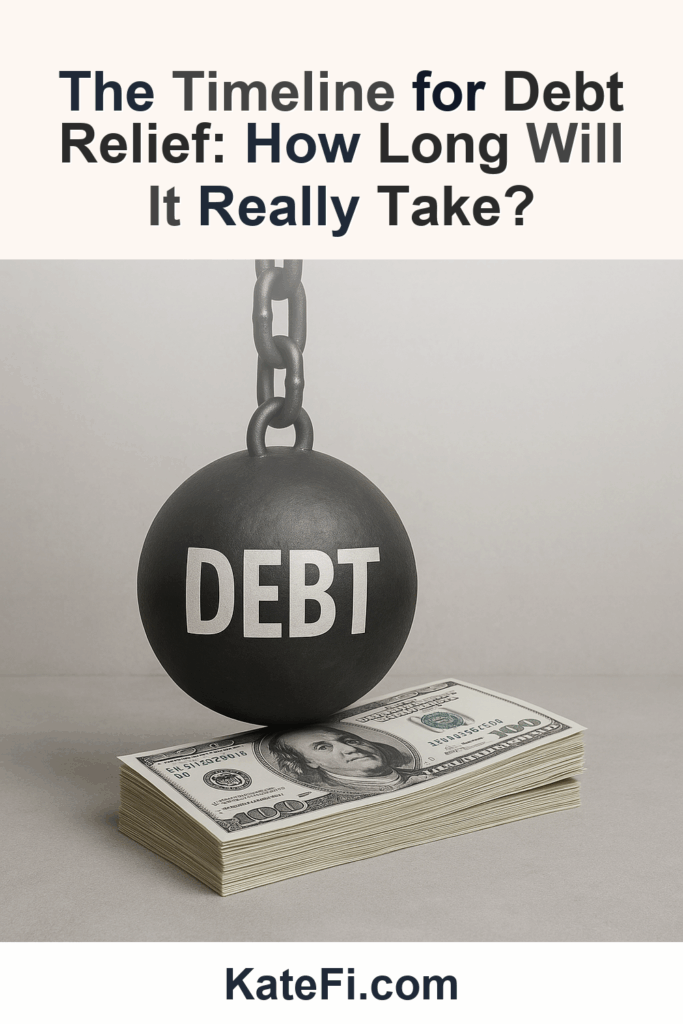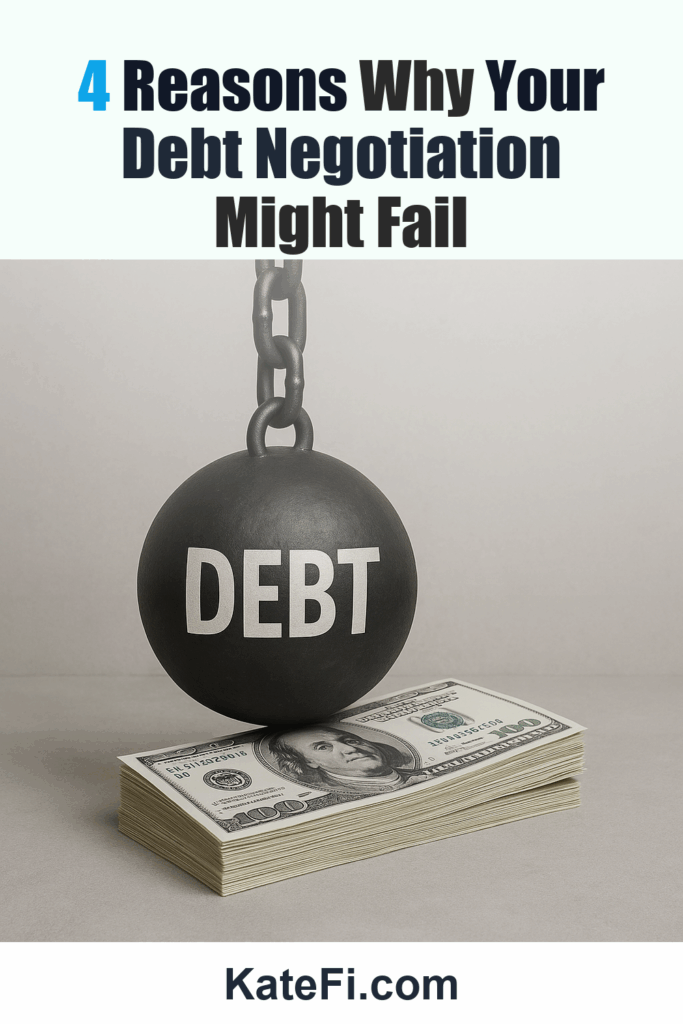10 Surprising Facts About Debt Relief You Need to Know
Navigating the world of debt relief can feel like an uphill battle, especially when you’re already juggling the stress of financial hardship. But understanding how debt relief works can empower you to take control of your financial situation. Here, we will share ten surprising facts about debt relief that may change your perspective and help you negotiate a better outcome. Plus, we’ll guide you on what documentation you need to gather for a smoother process.
Love our content? Show your support by following us — pretty please!🥺
FOLLOW ON PINTEREST
Hi! I’m Kate, the face behind KateFi.com—a blog all about making life easier and more affordable.
✅ See If You Qualify for Debt Relief
1. Debt Relief Isn’t Just for the Unemployed
What You’ll Learn on the Call
- Estimated timeline and monthly payment range
- How credit may be affected in the short term
- What documents to gather to move faster
Not available in IL, KS, OR, TN, UT, WV.
Many believe that only those without a job can seek debt relief, but that’s a common misconception. People with jobs may still find themselves overwhelmed with debt due to unexpected medical bills, a divorce, or even student loans. If your expenses exceed your income, it might be time to explore debt relief options.
Don’t wait until you’re unemployed to take action. If you’re struggling, get a free consultation to discuss your options.
2. Your Credit Score Will Be Affected, But It’s Not the End
One of the primary concerns many people have is how debt relief will impact their credit score. While it’s true that entering a debt relief program can initially lower your credit score, it might improve your credit in the long run. Once your debts are settled, you may be in a better financial position to make on-time payments on any remaining accounts.
Keep in mind that the impact on your credit score varies by individual situation and state, so it’s essential to understand the full scope before making decisions.
3. Hardship Documentation Is Key
Lower Your Unsecured Debt
If you have $5,000+ in credit card or personal loan debt, a free consult can review options like settlement or hardship plans.
- One-on-one call to review your debts and goals
- See potential monthly payment reductions
- No obligation to enroll
Not available in IL, KS, OR, TN, UT, WV.
When negotiating debt relief, having the right documents ready can speed up the process. This includes proof of income, monthly expenses, bank statements, and any relevant bills. Gather the following documents for a faster review:
- Proof of Income: Pay stubs or tax returns.
- Monthly Expense Statements: Bills for utilities, rent, groceries, etc.
- Bank Statements: To give a complete picture of your finances.
- Debt Statements: Details of all debts, including amounts owed and payment history.
Having these documents ready not only shows creditors that you are serious about settling your debts but also helps you in negotiations.
✅ See If You Qualify for Debt Relief
4. Negotiation Can Lead to Significant Savings
Negotiating with creditors can lead to significant reductions in the amount you owe. In some cases, creditors may be willing to accept less than the full balance to settle an account. It’s not uncommon for people to settle their debts for 30% to 70% less than the original amount owed.
However, approaching this negotiation effectively is vital. Here are some tactics to consider:
- Start Low: Offer a lower amount than what you’re willing to pay; this leaves room for negotiation.
- Be Honest About Your Situation: Explain your financial hardship clearly and sincerely.
- Stay Calm and Professional: Anger or desperation can hinder your negotiating power.
Having a trained professional can make a significant difference. Consider getting a free consultation to discuss strategies tailored to your specific situation.
5. You Can Qualify for Multiple Types of Debt Relief
Debt relief isn’t a one-size-fits-all approach. Various options include:
| Debt Relief Option | Description | Best For |
|---|---|---|
| Debt Settlement | Negotiating to pay less than owed. | High debt amounts |
| Credit Counseling | Working with a counselor to create a plan. | Overall financial management |
| Debt Management Plans | Structured repayment plans through a third party. | Consumers wanting to avoid bankruptcy |
| Bankruptcy | Legal process for discharging debts. | Severe financial distress |
Understanding which option suits your needs best is crucial. Each option comes with its pros and cons, and you should weigh these carefully.
6. Most People Are Unaware of Their Rights
Consumers have rights when it comes to debt collection practices. The Fair Debt Collection Practices Act (FDCPA) provides protections against abusive practices by collectors. For example, collectors cannot call you at unreasonable hours, harass you, or make false statements about what you owe.
Understanding these rights can empower you during negotiations. You have a voice in this process, and it’s important to exercise it.
✅ See If You Qualify for Debt Relief
7. It’s Possible to Negotiate Directly with Creditors
While many opt for debt relief companies to handle negotiations, you can certainly take this on yourself. Direct negotiation with your creditors can often yield favorable results. Be prepared with your documentation and a clear understanding of what you can afford to pay.
Using scripts can help keep your conversation on track. Here’s a basic script to guide you:
—
Debt Negotiation Script
“Hello, my name is [Your Name], and I’m calling regarding my account with [Creditor Name]. Due to [your situation, e.g., medical bills, job loss], I’m currently facing financial hardship and would like to discuss the possibility of settling my debt for a lower amount. Can you assist me with this?”
—
Having a structured approach can help reduce anxiety and lead to better outcomes.
8. The Timing of Your Negotiation Matters
Timing can greatly affect the outcome of your negotiations. Many creditors are more open to negotiations when they believe you are genuinely struggling. It’s typically better to initiate contact as soon as you know you’re having difficulty making payments rather than waiting until you’re behind.
Additionally, contacting creditors during their slower business hours may lead to more favorable results as representatives might have more time to consider your situation.
9. Don’t Forget the Importance of Follow-Up
Once you’ve initiated negotiations, following up is critical. If you don’t hear back within a reasonable time frame, don’t hesitate to reach out again. Keeping the lines of communication open shows that you are committed to resolving your debts.
—
Follow-Up Checklist
- Record the date of your initial conversation.
- Set a reminder to follow up within one week if you haven’t heard back.
- Document all communications for reference.
—
10. Professional Help Can Make a Difference
While you can certainly handle negotiations yourself, working with a professional can provide expert insight and leverage. Debt relief professionals understand the ins and outs of debt negotiation and can often achieve better outcomes than individuals acting alone.
Consider taking the first step by getting a free consultation to explore your options. You don’t have to do this alone!
Important: This content is for education only—not legal, tax, or financial advice. Results and eligible programs vary by situation and state. Fees apply if you enroll and complete a program. Debt relief can affect credit; missed payments may lead to collections/lawsuits. Not available in IL, KS, OR, TN, UT, WV.
In conclusion, understanding the world of debt relief is crucial to successfully navigating your financial challenges. By keeping these surprising facts in mind and preparing yourself with the right documentation and strategies, you can work toward achieving financial freedom. Take charge of your financial future—consider exploring your options today!






















